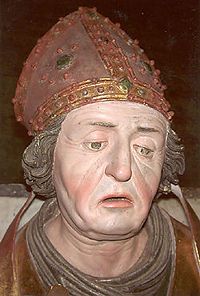Today, we celebrate the feast day of Saint Severinus (died
482), monk, hermit, prophet, and founder of monasteries. Saint Severinus labored diligently for the
Lord, focusing his attention on the region of Noricum (modern day
Austria). Through his efforts, the
faith was spread to those regions, where he practiced charity and provided
refuge to all trying to escape war and poverty. Saint Severinus lived the Gospel, demonstrating through his
actions and words the love and redemption made possible through Christ.
 Severinus left home at an early age, and took great pains to
hide his family origins. Given what we
know of him, including his well-developed Latin abilities, he was likely a
Roman of noble birth. However, he gave
up this life of wealth and privilege, and spent his early years in the deserts
of the East. There, he lived the life
of a hermit, growing closer to God, listening attentively to His will, and
following where He might lead. While
there, he served as spiritual director and father to Saint Anthony of Egpyt.
Severinus left home at an early age, and took great pains to
hide his family origins. Given what we
know of him, including his well-developed Latin abilities, he was likely a
Roman of noble birth. However, he gave
up this life of wealth and privilege, and spent his early years in the deserts
of the East. There, he lived the life
of a hermit, growing closer to God, listening attentively to His will, and
following where He might lead. While
there, he served as spiritual director and father to Saint Anthony of Egpyt.
Eventually, Saint Severinus felt called to a life of
evangelization, and left the desert. He
traveled to Noricum, where he spent the next 30 years of his life evangelizing
and ministering to the peoples living along the banks of the Danube River, near
modern-day Vienna. He labored to
establish several monasteries, but found that the local citizens were none too
keen to embrace Christianity. Given the
gift of prophecy, Severinus predicted the arrival of the Huns and the
destruction that would occur, and prepared by creating shelters and refuges (in
advance!) for those who would need them.
Having laid in food and provisions, he assisted many in surviving the
deadly attacks.
Following this, Severinus’ reputation for holiness spread
quickly throughout the region, and many were converted. The monasteries were soon full, and more
were constructed. He was sought out for
assistance in times of famine, natural disaster, and other calamities. Always quiet and steady, Saint Severinus
would preach penance and conversion to the people, and each time, crises were
averted. He lived to spread the Word of
God, and focused solely on this noble mission throughout the end years of his
life.
Saint Severinus also practiced what he preached. He ate only once each day, fasting almost
completely during Lent. He always
traveled barefoot, and dressed in thin robes regardless of the weather. He slept on sackcloth on the ground, and
urged the monks in his monasteries to do the same. All this, considered penance, he offered for those in need.
Generally surrounded by people, Severinus occasionally took
refuge in a hermitage, where he harkened back to his days in the desert,
communing internally with the Lord. It
was there that he died, on January 8, 482, in his cell, singing Psalm 150. Of course, always a prophet, Severinus had
predicted the date and time of his own death accurately. He was laid to rest, but during subsequent invasion,
his relics were moved and interred in Naples, Italy at the Benedictine
monastery of San Severino.
Psalm 150
1 Praise the Lord.
Praise God in his
sanctuary;
praise him in his mighty heavens.
2 Praise him for his acts of power;
praise him for his surpassing greatness.
3 Praise him with the sounding of the trumpet,
praise him with the harp and lyre,
4 praise him with timbrel and dancing,
praise him with the strings and pipe,
5 praise him with the clash of cymbals,
praise him with resounding cymbals.
praise him in his mighty heavens.
2 Praise him for his acts of power;
praise him for his surpassing greatness.
3 Praise him with the sounding of the trumpet,
praise him with the harp and lyre,
4 praise him with timbrel and dancing,
praise him with the strings and pipe,
5 praise him with the clash of cymbals,
praise him with resounding cymbals.
6 Let everything that has breath
praise the Lord.
Praise the Lord.
Paul the Deacon described the qualities of Saint Severinus
in the 8th Century as: “In these territories of the Noricans at that
time was the monastery of the blessed Severinus, who, endowed with the sanctity
of every abstinence, was already renowned for his many virtues, and though he
dwelt in these places up to the end of his life: now however, Neapolis keeps
his remains.”
We pray today for the quiet determination and piety of Saint
Severinus, and for all those who are in need, displaced by war or suffering
from famine. May the Lord bless each of
us in our daily life, as He so blessed Saint Severinus.









No comments:
Post a Comment
Thanks for leaving a comment. If you wish to submit a prayer request, however, please do so above, using the "Contact" tab.